R. H. Robertson
Robert Henderson Robertson (April 29, 1849 – June 3, 1919) was an American architect who designed numerous houses, institutional buildings and churches.
R. H. Robertson | |
|---|---|
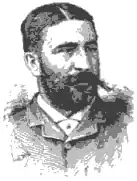 | |
| Born | Robert Henderson Robertson April 29, 1849 Philadelphia, Pennsylvania |
| Died | June 3, 1919 (aged 70) Nehasane, Hamilton County, New York |
| Education | Rutgers College |
| Occupation | Architect |
| Spouse(s) | Charlotte Markoe |
| Children | 1 |
| Signature | |
 | |
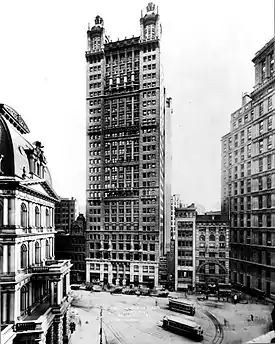
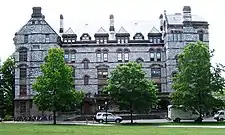
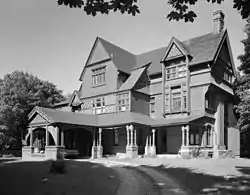
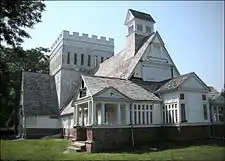
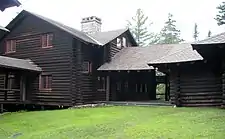
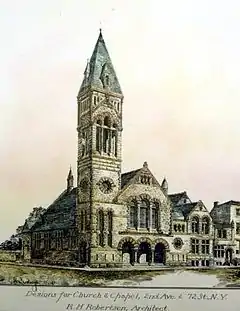
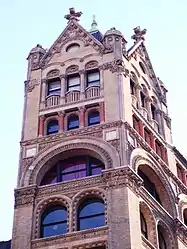
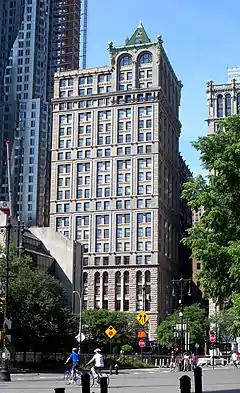
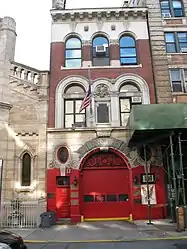
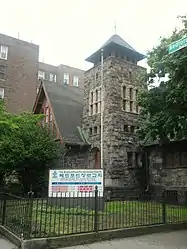
Life and career
Robertson was born in Philadelphia of Scottish parents Archibald Robertson and Elizabeth Henderson.[2] He was educated in Scotland, then graduated from Rutgers College in 1869. He apprenticed for several years in Philadelphia with Henry A. Sims, then moved to New York to work first for George B. Post, then in 1873-74 for Edward Tuckerman Potter.[2] Having completed one of the first houses in America that manifested the "Queen Anne style", a cottage for Theodore Timson in Sea Bright, New Jersey (1875),[3] he formed a partnership with Potter's half-brother, William Appleton Potter, who also trained with Post. The partnership lasted from 1875 to 1881, working in a free Gothic Revival style; Robertson, the junior partner, appears to have been responsible for the firm's residences.[4] In the 1880s, working on his own, he fell under the influence of H.H. Richardson's "Richardsonian Romanesque" a freely-handled revival style that depended for its effect on strong massing and the bold use of rustication. In the 1890s, in the wake of the "White City" of the World's Columbian Exposition, Chicago, he began to work in a classical style.
He married Charlotte Markoe, and they had one son.[2]
Robertson died June 3, 1919, at William S. Webb's Adirondack lodge in Nehasane, Hamilton County, New York, which he had designed. He is buried in Southampton, New York.[5]
Commissions
Potter & Robertson
During his New York partnership with William Appleton Potter, from 1875 to 1881, the firm produced summer vacation cottages in Newport, Rhode Island, and the Jersey Shore, beginning with the Bryce Gray residence in Long Branch c.1877, now demolished.[4] Potter and Robertson also designed:
- South Congregational Church (1871–1875) – Springfield, Massachusetts
- Phillips Presbyterian Church (1873)[6]
- Brown University Library (1875)
- Stuart Hall (1875–77) – Princeton Theological Seminary
- Witherspoon Hall (1875–77) – Princeton University
- Brown University Library (1875) – Providence, Rhode Island
- University Hotel (1875–77) – Princeton, New Jersey, demolished[7]
- Grace Church Chapel (1876) – East 14th Street; the third chapel for Grace Church, and the second on this site, replacing one that burned down in 1872; demolished.[8]
- Alpha Kappa Lodge (1876) – Williams College, Williamstown, Massachusetts.[9]
- St. Augustine's Episcopal Church and Mission House (1876–77) – 107 East Houston Street[10]
- Commodore Charles H. Baldwin House (1877–78) – Newport, Rhode Island; a multi-gabled essay in the Queen Anne style showing the influence of Norman Shaw,[11] and H. H. Richardson's Newport residence for William Watts Sherman (1874–76).[4]
- "Hillside", also known as the Adam-Derby House (1878) – Oyster Bay, New York, for Sarah Sampson Adam. The partnership's only documented house on the Long Island Gold Coast is also in the Queen Anne style.[12]
- Christ Episcopal Church (1878) – Oyster Bay, Long Island; altered by Delano & Aldrich in 1925, who encased the domestic-looking church in stone.[13]
- St. James Protestant Episcopal Chapel, known as the Church of the Presidents (1879) – Long Branch, New Jersey
Solo
Robertson's Park Row Building (1899) at 15 Park Row, built for August Belmont, was, for a brief period, the world's tallest office building.[14] Among his many other commissions in New York City and elsewhere:[15]
- St. James Episcopal Church (1881) – East 71st Street & Madison Avenue. Altered by Ralph Adams Cram and others. Collapsed tower replaced by a spire, 1950.[16]
- Church of the Holy Spirit (1881–83) – 775 Madison Avenue, demolished 1905[17]
- Madison Avenue Presbyterian Church (1881–84) – East 60th Street & Madison Avenue, demolished[18]
- 23 East 67th Street (1882–83) – Redesigned in the neo-Federal style and an additional storey added by Sterner and Wolfe in 1919.[19]
- Mott Haven (138th Street) Railroad Station (1885–86) – demolished
- YWCA Building (1885–87) – 7-11 East 15th Street. Now used by the Soka Gakkai International-USA Cultural Center, the Buddhist Association for Peace, Culture and Education.
- Drew Theological Seminary Library (1886) – Madison, New Jersey. Published in The American Architect and Building News 20 March 1886.[20]
- "Sunnymede", Dr. Francis H. Markoe house (1886–87) – Southampton, Long Island. Dr Markoe was Robertson's brother-in-law.[21]
- Knox Presbyterian Church (1887) – 252 East 72nd Street, now known as St. John the Martyr Roman Catholic Church (Manhattan)[22][23]
- Bushnell House (1887–88) – 838 East High Street, Springfield, Ohio. Built for Asa Bushnell and his wife Ellen, and now a funeral home, the Bushnell House exemplifies Robertson's Richardsonian Romanesque style.[24] It is part of Springfield's East High Street Historic District,[25] which is listed on the National Register of Historic Places.[26]
- "Wyndcote", Robertson's residence (1887–88) – Southampton, Long Island.[21]
- Phelps Stokes-J.P. Morgan, Jr. House (1888) – 231 Madison Avenue; Robertson significantly enlarged this Italianate mansion, which was originally built in 1852-53. A New York City landmark.[27]
- Christ Church (1887–89) – Poughkeepsie, New York
- "Hammersmith Farm" (1887–89) – Newport, Rhode Island, for John W. Auchincloss
- Jan Hus Bohemian Brethren Church (1888) – 347 East 74 Street[28]
- Rutgers Presbyterian Church Chapel (1888) – West 73rd Street; named after the same man, Col. Henry Rutgers, as Rutgers University[29]
- Margaret Louisa Home (1889–91) – 14-16 East 16th Street
- St. Luke's Episcopal Church (1889–90) – 73 South Fullerton Avenue, Montclair, New Jersey[30]
- 13 East 71st Street (1891–92) – town house[16]
- Church of the Messiah and Incarnation (1892) – Greene Avenue, Brooklyn. Completed the design of James H. Giles.[31]
- St Luke's Church (1892) – Convent Avenue, Hamilton Heights (Manhattan)[32] Within the Hamilton Heights Historic District,[33]
- Pequot Library (1893) – Southport, Connecticut. Meticulously restored in 2008.[34]
- American Tract Society Building (1894–95) – 150 Nassau Street[35] Combining elements of Renaissance Revival and Romanesque Revival styles, this is one of the earliest steel-framed structures; it is clad in gray Westerly granite, gray Roman brick and tan architectural terracotta.[36] A New York City landmark.[37]
- Engine Company 55 Firehouse (1895) – Fire Department of New York[38]), 363 Broome Street, Manhattan.[39] A New York City landmark.[40]
- New York Savings Bank (1896–97) – Eighth Avenue at West 14th Street (northwest corner). The grand Roman banking hall was occupied by Central Carpet, then by the upscale grocery mart, Balducci's (2005-2009).[41] It and its twin across the street[42] serve as New York's gemelli churches. A New York City landmark.[43]
- Academy of Medicine (1889) – 17 West 43rd Street, demolished
- Rutgers Riverside Presbyterian Church (1889–90) – Broadway and West 73rd Street, demolished and replaced with the present structure
- Lincoln Building (1889–90) – 1-3 Union Square West. A New York City landmark.[44]
- MacIntyre Building (1890–92) – 874 Broadway, lofts, the AIA Guide to New York City (4th ed.) calls refers to the building's style as "unspeakable eclectic"[1]
- United Charities Building (1891–1892) – East 22nd Street and Park Avenue South, designed with Rowe & Baker
- Mohawk Building (1891–92) – 160 Fifth Avenue[45]
- Mendelssohn Hall (1891–92) – for the Mendelssohn Glee Club[46]
- Church of St Paul and Parish House (1895–97) – 540 West End Avenue at West 86th Street. Tuscan Renaissance in tan brick and limestone, with an octagonal campanile at the corner. The AIA Guide to New York City (4th ed.) calls this church, with its octagonal corner tower, "a startling work." It's now the Church of St. Paul and St. Andrew and is shared with Congregation B'nai Jeshurun.[47] A New York City landmark.[48]
- First Reformed Dutch Church (1896–1897) – Somerville, New Jersey
- Fourth Universalist Society in the City of New York (1898) – Central Park West and 76th Street. Mosaic in interior.
- Moses Allen and Alice Dunning Starr House (1897–99) – 5 West 54th Street; a New York City landmark.[49]
- Bedford Park Presbyterian Church (1900) – Bedford Park Boulevard, the Bronx[50]
- Lying-in Hospital (1902) – 305 Second Avenue between East 17th and 18th Streets, now "Rutherford Place", apartments and offices[51]
- Corn Exchange Bank Building
- Shelburne Farms – Shelburne, Vermont. Shelburne House, the Breeding Barn, the Farm Barn and the Coach Barn make up Robertson's most ambitious farm complex. Robertson designed the adjacent Shelburne Railroad Station (1890).[52]
- Camp Santanoni Main Camp Complex – Newcomb, New York; for Robert C. Pruyn of Albany, a Yale classmate of Robertson's. The first Adirondack camp to be comprehensively designed as a unit by a professional architect.[53]
Robertson & Potter
In 1902 Robertson took in as partner Robert Burnside Potter, nephew of William Potter. They designed a cottage, perhaps several, for Regis H. Post in Bayside, Long Island.[4]
References
Notes
- White & Willensky, p.195
- The National Cyclopaedia of American Biography. VI. James T. White & Company. 1896. p. 98. Retrieved November 26, 2020 – via Google Books.
- It was illustrated in The American Architect and Building News, July 22, 1876, without the client's name (illustration Archived 2010-06-13 at the Wayback Machine).
- MacKay, Baker and Traynor, p. 165
- "Robert H. Robertson Dead". The New York Times. June 5, 1919. p. 13. Retrieved November 26, 2020 – via Newspapers.com.
- Dunlap, p.135
- illustration from The American Architect and Building News, 5 February 1876.
- Dunlap, p.89
- The design was illustrated in The American architect and Building News 27 May 1876 (illustration Archived 2010-06-13 at the Wayback Machine
- Dunlap, p.193
- Illustration
- MacKay, Baker and Traynor, pp. 165–67
- MacKay, Baker and Traynor, p. 166; the Potter & Robertson design, as first built, was illustrated in The American architect and Building News, 12 October 1878 (illustration Archived 2010-06-13 at the Wayback Machine)
- White & Willensky pp.67–68
- Noted in obituary, "Robert H. Robertson Dead", The New York Times, June 5, 1919 and in McKay, Baker & Traynor
- White & Willensky, p.407
- Dunlap, p.11
- Dunlap, p.44
- Landmark permit 23 March 2007 Archived 8 October 2008 at the Wayback Machine.
- Illustration.
- MacKay, Baker and Traynor, p. 167
- Dunlap, p.219
- "A Starter Sanctuary", New York Times, 4 June 2009. Accessed 5 June 2009
- Elwin Robison, and Kevin Rose, "East High Street: An Open Museum of Architecture and Enterprise" Archived 2008-11-20 at the Wayback Machine
- National Register District Address Finder Archived 2013-09-28 at the Wayback Machine, Ohio Historical Society, 2013. Accessed 2013-01-18.
- "National Register Information System". National Register of Historic Places. National Park Service. July 9, 2010.
- NYCLPC, p.98
- Dunlap, p.116
- Dunlap, p.186
- St. Luke's Episcopal Church Archived 2010-01-05 at the Wayback Machine
- Published in American Architect & Building News 3 April 1886 (illustration).
- White & Willensky, p.483
- NYCLPC, p.189
- "Pequot Library, Southport CT"
- NYCLPC, p.27, gives the dates 1894-95; White & Willensky, p.68, gives the date as 1896
- Landmarks Preservation Committee Designation List (pdf file)
- NYCLPC, p.27
- Landmarks Preservation Committee Designation List for the American Tract Society Building says 1898–99.
- White & Willensky, p.85
- NYCLPC, p.47
- "In Rough Market, a Slow Market (Balducci’s) Suffers", New York Times, 6 April 2009. Accessed 6 April 2009: images.
- New York County Savings Bank
- NYCLPC, p.59
- NYCLPC, p.76
- White & Willensky, p. 196
- "Mendelssohn Glee Club: Opening of New Home Built for It By Mr. Clark" (PDF). New York Times. December 7, 1892. p. 4.
- White & Willensky, p.332
- NYCLPC, p.148
- NYLPC, p.116
- White & Willensky, p.601
- White & Willensky, p.210
- Potter, Janet Greenstein (1996). Great American Railroad Stations. New York: John Wiley & Sons, Inc. p. 121. ISBN 978-0471143895.
- "Camp Santanoni Historic Area" on the New York State Department of Environmental Conservation website
- White & Willensky, p. 397
- NYCLPC, p.22
- White & Willensky, p.63
Bibliography
- Dunlap, David W. (2004). From Abyssinian to Zion: A Guide to Manhattan's Houses of Worship. New York: Columbia University Press. ISBN 0-231-12543-7.
- MacKay, Robert B.; Baker, Anthony B. and Traynor, Carol A. Long Island Country Houses and Their Architects, 1860-1940 (1997)
- New York City Landmarks Preservation Commission; Dolkart, Andrew S.; Postal, Matthew A. (2009). Postal, Matthew A. (ed.). Guide to New York City Landmarks (4th ed.). New York: John Wiley & Sons. ISBN 978-0-470-28963-1.
- White, Norval & Willensky, Elliot (2000). AIA Guide to New York City (4th ed.). New York: Three Rivers Press. ISBN 978-0-8129-3107-5.
External links
 Media related to R. H. Robertson at Wikimedia Commons
Media related to R. H. Robertson at Wikimedia Commons Media related to Potter & Robertson at Wikimedia Commons
Media related to Potter & Robertson at Wikimedia Commons- Multimedia slide show of Robertson's career
- R. H. Robertson at Find a Grave